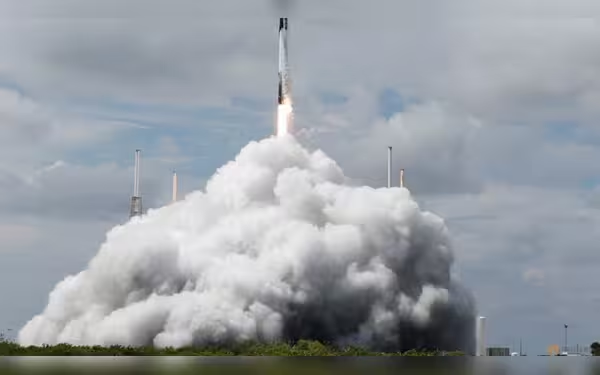Saturday, November 16, 2024 08:54 PM
FAA Grounds SpaceX Falcon 9 Rocket Due to Malfunction
- FAA grounds Falcon 9 after second-stage malfunction.
- SpaceX's third grounding in three months raises concerns.
- Investigation ongoing as SpaceX seeks to resume launches.
 Image Credits: channelnewsasia
Image Credits: channelnewsasiaThe FAA has grounded SpaceX's Falcon 9 rocket after a second-stage malfunction, marking the third incident in three months.
In a significant development for the aerospace industry, the U.S. Federal Aviation Administration (FAA) has grounded SpaceX's Falcon 9 rocket following a malfunction of its second stage. This incident marks the third grounding of the Falcon 9 in just three months, raising concerns about the reliability of this crucial rocket, which has been a workhorse for NASA and other missions.
The grounding comes after SpaceX successfully launched two astronauts to the International Space Station (ISS) on Saturday. However, during the mission, the rocket's second stage failed to re-light its engine for a procedure known as the "deorbit burn." This step is essential as it ensures the booster safely falls into the ocean after completing its flight. Fortunately, the astronauts reached the ISS without any issues, docking as planned on Sunday.
The FAA reported that there were no injuries or property damage related to the booster malfunction. However, the booster ended up in a part of the Pacific Ocean that was outside the designated safety zone approved for the mission. SpaceX acknowledged the issue, stating that the booster "experienced an off-nominal deorbit burn," which led to its landing in an unintended area.
In a post on X, SpaceX emphasized, "We will resume launching after we better understand root cause." This incident is particularly concerning as it follows two previous groundings in recent months. In July, a second-stage issue caused a batch of Starlink satellites to be lost, marking SpaceX's first mission failure in over seven years. The company managed to resume flights just 15 days later. In August, another grounding occurred due to a first-stage landing failure, although this did not impact the mission's success.
As SpaceX continues its engineering investigation under FAA oversight, it is expected to seek approval to resume flights. The FAA plays a crucial role in regulating rocket launches and re-entries to ensure public safety. Since the beginning of 2024, SpaceX has been launching an impressive average of two to three rockets each week, significantly outpacing its competitors in the launch industry.
While the Falcon 9's first stage is reusable, the second stage is not, which adds to the complexity of the situation. The grounding comes at a tense time for both SpaceX and the FAA, as they have been in a public dispute over the speed of launch licensing regulations and fines imposed on SpaceX for alleged violations of its Falcon launch licenses in 2023.
It is important to note that the Falcon 9 grounding does not directly impact SpaceX's Starship program, which has undergone four tests since 2023. However, SpaceX has expressed frustration over the FAA's slow approval process for Starship's fifth flight test, which aims to achieve more ambitious objectives than previous tests.
As the aerospace community watches closely, the outcome of SpaceX's investigation and the FAA's response will be pivotal in shaping the future of space exploration. The Falcon 9 has been a reliable asset for many missions, and its continued success is vital for both commercial and governmental space endeavors. The challenges faced by SpaceX serve as a reminder of the complexities involved in space travel and the importance of safety in this rapidly evolving industry.













